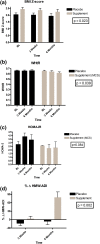Effects of Mixed Carotenoids on Adipokines and Abdominal Adiposity in Children: A Pilot Study
- PMID: 28323947
- PMCID: PMC6283444
- DOI: 10.1210/jc.2017-00185
Effects of Mixed Carotenoids on Adipokines and Abdominal Adiposity in Children: A Pilot Study
Abstract
Context: Carotenoids have been implicated in the regulation of adipocyte metabolism.
Objective: To compare the effects of mixed-carotenoid supplementation (MCS) versus placebo on adipokines and the accrual of abdominal adiposity in children with obesity.
Design and setting: Randomized (1:1), double-blind, placebo-controlled intervention trial to evaluate the effects of MCS over 6 months in a subspecialty clinic.
Participants: Twenty (6 male and 14 female) children with simple obesity [body mass index (BMI) > 90%], a mean age (± standard deviation) of 10.5 ± 0.4 years, and Tanner stage I to V were enrolled; 17 participants completed the trial.
Intervention: MCS (which contains β-carotene, α-carotene, lutein, zeaxanthin, lycopene, astaxanthin, and γ-tocopherol) or placebo was administered daily.
Main outcome measures: Primary outcomes were change in β-carotene, abdominal fat accrual (according to magnetic resonance imaging), and BMI z-score; secondary outcomes were adipokines and markers of insulin resistance.
Results: Cross-sectional analysis of β-carotene showed inverse correlation with BMI z-score, waist-to-height ratio, visceral adipose tissue, and subcutaneous adipose tissue (SAT) at baseline. MCS increased β-carotene, total adiponectin, and high-molecular-weight adiponectin compared with placebo. MCS led to a greater reduction in BMI z-score, waist-to-height ratio, and SAT compared with placebo. The percentage change in β-carotene directly correlated with the percentage change in SAT.
Conclusions: The decrease in BMI z-score, waist-to-height ratio, and SAT and the concomitant increase in the concentration of β-carotene and high-molecular-weight adiponectin by MCS suggest the putative beneficial role of MCS in children with obesity.
Trial registration: ClinicalTrials.gov NCT02060279.
Copyright © 2017 Endocrine Society
Figures



References
-
- Li C, Ford ES, Mokdad AH, Cook S. Recent trends in waist circumference and waist-height ratio among US children and adolescents. Pediatrics. 2006;118(5):e1390–e1398. - PubMed
-
- Garnett SP, Baur LA, Cowell CT. The prevalence of increased central adiposity in Australian school children 1985 to 2007. Obes Rev. 2011;12(11):887–896. - PubMed
-
- Rao AV, Rao LG. Carotenoids and human health. Pharmacol Res 2007;55:207–216. - PubMed
Publication types
MeSH terms
Substances
Associated data
Grants and funding
LinkOut - more resources
Full Text Sources
Other Literature Sources
Medical
Research Materials
Miscellaneous

